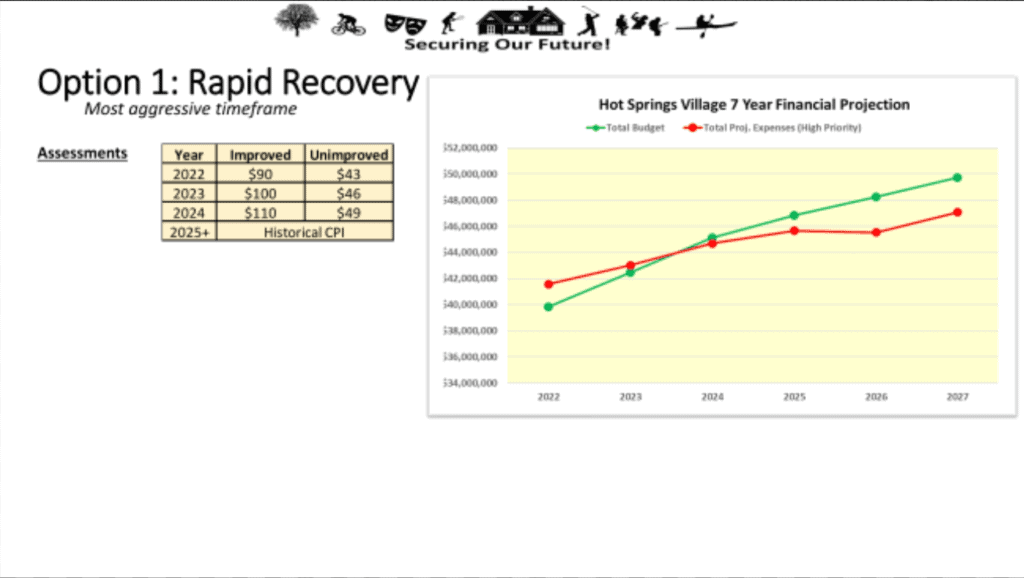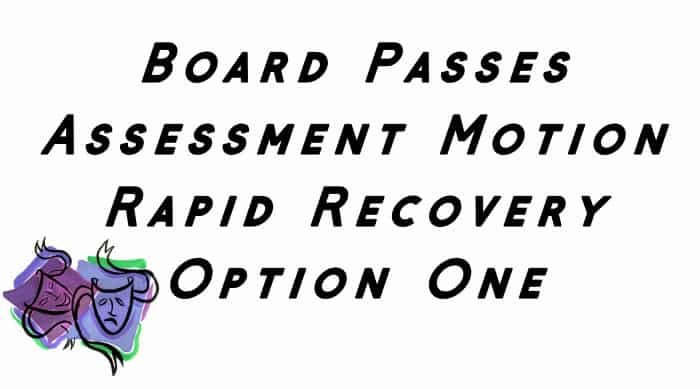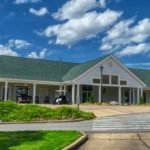The Hot Springs Village Property Owners Association Board of Directors held a Special Board Meeting on August 25, 2021, for the purpose of an assessment vote.
Sitting at the table:
Board Members: JoAnne (Joanie) Corry, Chair; Tucker Omohundro, Vice-chair; Robert (Bob) McLeod; Chris Jones; Gary Belair; Pamela (Pam) Avila
Staff: Stephanie Heffer, Corporate Secretary and Director of Programs and Operations; Coreena Fetterhoff, Corporate Treasurer, and Controller; John Paul, Interim General Manager; and Katrina Heap, Administrative Assistant to the GM
Additional Meeting Attendees:
Staff: Jason Temple, Director of Public Services; Paul Moore, Audio-Visual Manager
Note: what follows is a transcription of the meeting, which is deemed to be close, but not guaranteed to be perfect.
Executive Session
Corry: We had an Executive Session on 8/24, yesterday to discuss the assessment that we are going to vote on today. It is part of the financial health of the Village and that is why we had the executive session. Could I have a motion to approve the Executive Session minutes?
Avila: Moved
Jones: Seconded
Motion passed unanimously
Current Business
Corry: Our current business today is solely concerned with the assessment vote. And today the Board will be voting to accept a recommendation from the Future Revenue Analysis Task Force for an assessment increase. The decision was not made without considerable discussion, consideration of all possible options and the ramifications, and an understanding of the role of the Property Owners in the final decision. Our decision is based on very considerable depth and analysis performed by the FRATF, as well as input and comments from Property Owners.
Corry: The voting will be on Task Force Option 1 – Rapid Recovery and the details are on the screen behind me. [See below]
Corry: Through multiple media outreach efforts over the past eight months, Property Owners have been informed about the magnitude and complexities of the Village, itself, as well as the funding required to keep it running from day-to-day and maintain it over the long haul.
Corry: Property Owners have had the opportunity to participate in the process through nine eblasts and infographics, eight public meetings, and four forums held by the Task Force, plus numerous articles in the Village Voice. In addition, a special email box was set up, “yourvoice@hsvpoa.org” so that Property Owners could submit suggestions for increasing revenue and controlling expenses. More than 300 emails were received, recorded, and vetted.
Corry: This Board is 100% committed to the monies from this assessment increase going for critical infrastructure needs, some of which have been deferred for far too long. To ensure that future Boards adhere to this commitment, we are developing a policy that includes safeguards around the assessment increase funds.
Corry: We are currently working with the Task Force, with the Finance and Planning Committee, our Controller, and our legal advisors on the correct wording and form of the policy.
Corry: This policy will be put into place before the assessment vote.
Corry: In addition, the Board intends to grow the trust and confidence of Property Owners through consistent reporting on the expenditures of the assessment increase funds.
Corry: The vote today by the Board puts the future of the Village squarely into the hands of the Property Owners, themselves.
Audience Comments
Corry: At this time we are opening the meeting for comments from those attending here today. We will adhere to the three-minute rule and we will close the floor for comments at around 10:00. We will then have a motion and second by the Board and vote on it. So, is there anyone in the audience that would like to make a comment? If you would, do we have a sign-up sheet?”
Heap: Answered in affirmative regarding sign-up sheet
Tom Ament: My name is Tom Ament and I live at *** in Hot Springs Village, Arkansas. I wanted to tell you today that there was a letter in the Voice from me regarding the assessment increase and it is generated from a previous Villager commenting about, ‘we had time to wait.’
Ament: In my urgency to get it over to the Voice, I left out a critical word. And if people read it, it looks it says, ‘we can wait.’ I am correcting it now and it will be corrected in the Voice. We cannot wait for an assessment increase. We must do it now. We have had more than enough study.
Ament: However, while I was in favor of Option 3 from the FRATF committee, I will certainly get behind this because of what I heard this morning about [what] you will tell us and put in place a policy [of] how you’re going to spend the money and then you are going to report back to us.
Ament: It is a jump and it has happened before. But we can get this done and we must get it done because we cannot wait any longer. Thank you for your time and I am sorry for the confusion.
Corry: Thank you. It is nice to have that confusion cleared up and we appreciate that. Anyone else?
Laurie Rushing: My name is Laurie Rushing and I am a homeowner here in the Village. Been here about two years now. Former state representative and a realtor in the area. And I just wanted to, as I am looking at the option that y’all chose, I want to applaud you for making this decision and kind of taking out that $1,500 towards the new homeowners. We appreciate that. I do see – I am very much in favor of this dues increase because even when I moved here, I realized how low we were in comparison to the amenities that we get and I appreciate all of your hard work.
Corry: Thank you. Anyone want to respond to that.
Omohundro [clarifies]
Omohundro: The member buy-in fee is not off the table. That is not a vote of the community. That is a vote of the Board, so we just want to be clear on that. This is what has to be voted on by the Members. Fees and things of that nature are actually decided by the Board, so I don’t want to be – anybody to be misled in that area. That’s not off the table.
Corry: Okay, anyone else?
Melinda Noble: My name is Melinda Noble. I live at *** and I was hoping I’d never have to go to another one of these meetings.
Noble: I have said all along that we’re either going to have to not be a community like we have or we’re going to have to raise the dues or POA fees or whatever you want to call them. And we do need to raise them. I don’t have a problem with them being raised. I didn’t have a problem with a one-time assessment, which I still don’t know, might not be the best way to go. But anyway, the question is, you can have a policy for this Board that will do whatever you say the policy will do, but what is going to keep that policy in place when y’all are all gone – because I’ve seen a lot of changes in the ten years I have been here. And a policy is not worth the paper it is written on. You know it and I know it. So what’s going to lock someone into a policy and not bring us back to where we’ve been? And we all know what happened and I don’t want to see it happen again. I see that the POA is out buying lots again. How will these lots be voted? Or can they be voted, when this comes up for vote? I’d be interested in knowing how many lots the POA owns and if they can vote those lots and what’s going to be put in place to make sure that this doesn’t change with another Board or four years down the road? And when we vote, will we be voting on three years? I mean instead of a vote having to come up? So this will be a package deal?
Corry: Yes, it will.
Noble: Thank you.
Corry: Thank you. I’ll take the first crack at it. We understand exactly what you said. Future Boards can do what they want. We don’t control them. We can’t control them and we won’t all be on the Board for those three years.
Corry: So first of all I do want to say that you will, Chris and Robert will both be on the Board for three years and I think they are very steadfast in staying with what we’re proposing. I mean that’s, as Chris frequently tells us, this is his future because he is younger than we are. So, he frequently tells us this is his future and he is all for it.
Corry: We can only do the best that we can do and that is why we are trying to work with everyone to do the policy. There are enough people in the Village, in my opinion, that watch what the Board does, and when that policy goes into place, I think that will be a red flag to everyone that watches what happens. I believe when it comes – and they would have to bring it up to a vote to make the change, not to fund this or that?
Someone in the audience made a comment (undecipherable).
Corry: Yes, the new Boards, if they want to change that policy, it will have to come up for a vote. And if it comes up for a vote, I think there’s plenty of Villagers that will be watching that and saying, ‘no, that is not what we voted for you for.’
Noble: [It sounded like she said], ‘we went down this path before.’
Corry: With a policy?
Noble: It wasn’t a policy. It was just, we voted for what we thought we were getting and it was not what we got.
Corry: I understand. This Board is saying – this Board is saying for at least the first year anyway because we’ll still be on there, that that is what you will get – what’s in the policy. That’s our line in the sand, in my opinion.
Omohundro: You have to understand. We are limited by the Declarations.
Noble: Could the Declarations not be changed then?
Omohundro: Yes ma’am we can. But it can’t be in effect until ’27 if I’m not…
Corry: ’27
Omohundro: And we are actually looking at that. But we have to do something now that’s going to ensure at least, as she said. I am a little blunter about it. If a future board tries to change this policy, I’m thinking tar and feather. You know. The Villagers are going to not let that happen by their voice. We’re going to put something out there that is going to be so obvious that if you try to change it, you’re not going to fare well in this community. That’s our goal.
Omohundro: Now, to say it can’t happen, no. We can’t say that. I won’t try to say it. But I’ll promise you, it’s going to be hard. I’m going to be here for a while if I am alive. I am not going to be on the Board, but I promise you. I’m not going to sleep and I’ll be watching too.
Corry: Villagers, Property Owners will be able to see it front and center if a Board changes it, they’ll have to bring it up to a vote and change it. That’s as far as I know. As far as we’ve been able to determine, that’s the best we can do. But we need to get it worded correctly.
Omohundro: We spoke to the attorneys. We asked the attorney Monday if there is a way we can do a supermajority vote to change that. The By-laws, I don’t think allow that, but they’re checking on that now. So we may be able to come up with a vote that’s even harder for the Board to change it, by being five or six votes. But we don’t know if we can do that. But if we can do that, we probably will, if we can, legally. So we’re doing everything – all efforts are on this. But we just don’t know how it is going to turn out yet.
Corry: We can only do the best that we can do. So we’re trying. Stephanie, I will ask you to answer the lot question.
Heffer: The POA, I won’t give you the exact number because I don’t know the exact number. But somewhere in the neighborhood of 6,000 to 6,500 lots, we currently have in our inventory. And the POA has the right to vote those lots to make a quorum. Not to influence a vote. So if, in fact, there is not enough response from the Membership to meet the quorum for an assessment increase, the POA can vote their lots, but they have to vote them in the exact proportion of the populous. So if it is 60% no and 40% yes, we have to vote 60% no, 40% yes.
Heffer: So we can’t influence the vote. We can only ensure that a quorum is met so that the vote is validated.
Corry: Did that answer your question?
Noble: Yes.
Corry: Thank you. Okay, anyone else?
Melinda Alvord: I just have a quick question. What’s projected there shows the original FRATF three years out. You all last week were talking about going five years out. Is that off the table now? Or?
Corry: Exactly what’s on this screen is what we will be voting for.
Alvord: Great. Thank you.
Omohundro: The reason for that is we have – we did take a week to let the people – one final week. We feel like as a Board that some people have some good points. We want to prove and we want to gain trust. We know in our hearts, based on the information we see before us and also the way our country is going right now, we’re going to need to do this again in three years. But, we’re hoping that the campaign will be a lot easier when we gain the trust of the community and we spend the money where we say we’re going to spend it. So its not – we’re not changing – if I thought that this was going to do away with us getting money in the fourth or fifth year, I wouldn’t vote for it – ’cause I know that’s not enough. But we’re going to gain the trust. I hope we gain the trust and we’ll have another vote in three years for the following years and hopefully get the Declarations changed. So, if we can get a few percent above the CPI every year, maybe we won’t ever have to vote again. You know. We can maintain the community, hopefully without having to go through this every three or four years. The problem is you go three or four years, instead of five dollars a month, you need twenty [dollars]. If you do five a year, every year, then you don’t have this problem. I’ll be quiet.
Corry: Okay, anyone else?
John Hollansworth: My name is John Hollansworth. I am probably the oldest guy here and longest time – oldest resident as well as oldest age. I just want to express a great big thank you. Thank you. Thank you. Thank you to the Board; to the Task Force and all the untold free hours that you guys have donated to make this place a great place to live and we appreciate it.
Corry: Thank you John. Anyone else?
Laurie Rushing: Asks to speak again. I guess our question is if the Board decides to do the $1,500 assessment fee to the new homeowners in the area, when will that be voted on and will it be before this goes for a vote for the Property Owners or all y’all planning to do that after?
Avila: Can I answer that?
Omohundro: Yes.
Avila: So what we’re looking at overall is a balanced financial strategy going forward. The assessment increase itself is a part of that strategy. But the strategy also has to include looking at other sources of revenue as well as means of cost reductions. So the new-resident-buy-in-fee, which is what it is. It’s not an assessment. It’s a new-resident-buy-in-fee, will be a part of that strategy going forward. Right now, our focus is on getting the assessment increase passed. Then we will work on those other elements of the strategy.
Rushing: Okay. Correct. I think that that’s the way I understood it and I just wanted to make sure because it will make a difference on how I vote on this because if I know that there’s a possible $1,500, I am probably going to vote no. So I want to clarify that for everyone, where I just said that I applaud this and I am going to vote yes. I will probably now be a no, knowing that $1,500 is still in the working point. And I will actively campaign. And I know that the realtors, at least the realtors in our office [Trademark] are actively against it. As a realtor, our job is to protect homeownership and the cost – affordable homeownership. We make a pledge to do that. When I was in the legislature and all through my real estate career of 22 years, that has been one of my big, main focuses, that we don’t put a big increase on homeownership. And that is increasing.
Rushing: For the east-side people, $1,500 may not seem very much. But some people that are getting in the condos at $70,000 and $60,000 in the front end – that may be a lot. We may have people retiring here that are on a fixed income that can only afford so much and that $1,500 has got to be absorbed by the buyer or the seller at some point in time. So I just wanted to make it clear where I said that I was for this and I would promote this in my office, knowing that that is still on the table. It’s probably something that we won’t support. So I just want to make sure that I was on record saying that.
Avila: You know, please understand that whether the assessment increase goes through, or not, that buy-in fee will still be on the table. And if the assessment increase does not go through, then the buy-in fee will probably be even more important. So don’t misunderstand that.
Avila: The other thing that, to me, it bothers me about that, personally is that we have to make a decision for the good of the entire Village and I know that there are small groups and there are special interest groups that look at things differently. But our focus has to be the good of ALL of the Property Owners. ALL of them.
Rushing: I understand that and that is the task of a realtor, too, is to protect homeownership for ALL individuals. Not just those that may be in a different class or whatever they can afford one way or the other. So, I do understand that and understand that the assessment may still be on the table, but I wish you would consider taking it off the table so that we could all be in full support and we wouldn’t have this…fee, whatever they want to call it…fee…tax. I call it a tax because it is a tax in my book. You’re adding…I mean attorneys and everybody else have different names for it, whatever it is called.
Corry: Right. What we have looked at it as, is that it has nothing to do with the – it will not impact people that currently are Property Owners. The only ones that it will impact are new Property Owners…and what we’re…
Rushing: Exactly…
Corry: And what we are looking at, what we are looking at is, if you look at the Village and you look at everything, all the amenities we have, people have been paying on those for years. A new Property Owner, coming in, that $1,500 goes to help support those current amenities. So it will not affect the current Property Owners. It only affects new Property Owners and their… The point is that they need to help pay for the amenities that have been here, that they will get to enjoy immediately. They don’t have to wait for them to be built.
Rushing: In essence, it will affect the Property Owners because there will be an increase in their prices of their homes – because it is going to have to be absorbed somewhere – either by the buyer or the seller. In reality, there will be an impact to homeowners here in the Village, as well as ones that are buying in. So because that will have to be absorbed somewhere. So, I just hope when you get to that point, that you’ll take that into consideration, that you are affecting homeowners and you are affecting the homeownership, possibilities. And we spend lots of advertising dollars in order to get people to come here. And those advertising dollars that we as local realtors are spending, on top of what the POA is spending to bring people in, you know that’s almost like one of the things that we really tout is our low cost of living. And now we’re going to say, ‘you move in here, but we’re going to charge you $1,500 to move in here.’ And so you know, it is kind of a hard-selling point and so I just hate to see the market get stifled. I think the Village is just starting to grow. It’s starting to really get out there and I hate us to stifle that market. I appreciate your time.
Corry: Thank you. Anyone else have any comments?
Omohundro: You do realize…
Belair: I only have one short comment. I think it was 1976 that I passed the real estate broker exam and while studying for the exam and studying the market overall, I’ve got to tell you, I saw this type of equity buy-in in the ’70s. This community is late coming to the realization that the older we get, the more input we have to have to keep the place going. So, I have short… never mind.
Omohundro: I just want to make sure that you didn’t realize, and I think you do, the way you are talking, that if I buy your house here in the Village, I don’t pay the fee. You don’t pay the fee. This is just people that don’t own lots today – I say today, but the day we do this, if we do it – that’s the people it affects. It doesn’t affect the people that go from one house to the other or buying another lot or anything else. It’s just for new Property Owners.
Corry: New Property Owners
Omohundro: New Property Owners that do not own property here.
Corry: Okay, anyone else?
Becky Young: Becky Young, (states address). I didn’t plan on speaking so I will sign up on the sheet later. I have been aware for a long time of this critical step that we are taking now. It’s critical. It’s way overdue. I am aware of it. But there are thousands of people out there who are voting, who aren’t knowledgable. They haven’t been getting the emails that have been sent out. They just kind of, ‘leave me alone and let me be.’
Young: What is the plan to reach out so that you have made sure that everyone has been told more than once because when you get into marketing, I think the marketing people back this up. Telling them once doesn’t cut it. You’ve got to tell people over and over and over again. And you’ve only got a short time between now and when the vote starts in what? Middle of October?
Corry: November
Corry: I’m sorry. You are right. You are absolutely right. Middle of October. Yes. Sorry.
Young: There’s not a lot here on the calendar and there’s a lot that has to be done. You’ve got me convinced. In fact, I’ve been doing – can attest to this. A couple -[indecipherable] can attest to this, it’s been a very critical issue for me for a long time. What are you going to do? How are you going to get that need out to the rest of the people? It’s a big task. And I am just throwing that out because there is a big task that goes way beyond this great presentation and the great decision that you are making. So what is the future between…
Corry: Thank you for your question and I will let Pam answer that.
Avila: So there’s actually a group of Village Property Owners that have been working already to move any assessment increase vote going forward. And there is a very carefully strategized campaign that involves reaching every Property Owner through direct mail, several times. Direct mail by the way is very expensive, but it’s the only way to reach those that don’t have access to digital media. There will be many digital documents going out – many eblasts going out to reach those that have it – roughly 10,000 people. There will be articles in the Voice. There will be interviews on KVRE and spots. So, we’re doing our best to reach out to everyone as however is possible within the budget. Part of the challenge is that opportunities have already been put out there and you attended the forum. How many people did you see at the forum?
Young: That’s the problem. I’ve been in your seat. I’ve done this myself so I understand. It is very, very difficult.
Avila: And we understand that. We’ve got a program in place. We’re implementing that program. We believe it is a strong strategy if people have additional suggestions, they are welcome to make them. There’s actually been an email box set up. It is called, ‘speakup@hsvpoa.org’ so you will have access to that. There is a webpage in process and that should be done shortly. So you know, it is basically, you can lead a horse to water, but you can’t make him drink. So we’re leading the horse and we’re hoping they’ll drink.
Young: I was going to say that. You can lead the horse to water but you can’t make him drink.
Avila: We’re thinking alike.
Young: But you sure have the responsibility to make sure that the water is there and the water is accessible. And so, that’s my question. You’ve answered it. Again, it is critical that you get that out to every single person, more than once because once may not even get opened, if it is something in the mail. And this is so critical. Critical enough to make me get up here and say something. Thank you.
Corry: I think it is also important that you tell your friends. Word of mouth can mean more than anything.
Young: Believe me, I’ve been telling everybody that I know for years that this has to happen.
Corry: Well, keep it up and really hit it for the next month or so.
Young: Oh, I have and it will not stop because this has been something that I’ve been trying to get addressed for years for possibly ten years because I’ve seen this. I’ve seen it coming. I know how critical it is and it just hasn’t gotten the publicity and I am afraid it still has to have some really major effort to give it the publicity because it has to happen. There’s no question about it. It has to happen. Thank you.
Corry: Thank you. Thank you for your comments. Anyone else?
Beth Graves: Hello, my name is Beth Graves and I am another realtor in the Village. Just kind of food for thought. This is off the subject as far as the buy-in for new Property Owners. When you’re sitting in front of a client and you are…I just want to give you from our perspective. We have to be the ones – we are the ones on the front lines, selling the property. I think everyone here would agree with that. And we try very hard to do so. When you are selling this to a new Property Owner, we just want you to consider if the Board does go to this as a vote, please consider, those are things that we have to present to people. We’re legally bound and obligated to tell them about that. I don’t know if that has been considered on our part. We’ll be the one at the front line, having to do that. So in your consideration, please consider that. It’s not necessarily something that is really easy.
Graves: We have a private within a private community here at Diamante and we’ve seen what that had to change to and what buy-in fees if you will, have done to that community. Now it’s come a long way from what it once was. But just consider that, possibly please, in your consideration of that. I think that some more thought needs to be done and maybe even you know we have the real estate partner program with you guys. We would love to sit down with you and have a discussion about that. That hasn’t been done and I think that’s a fair request, as one of the real estate partners, I think that is a very fair request that we should maybe be at least a discussion about it.
Corry: Thank you.
Avila: I am sorry. I think that somehow we’ve gotten off of topic. This is the topic, not that.
Graves: Yes ma’am, I understand but we don’t have another opportunity and that was on your brochure that you sent out in the email and so I feel like this is an opportunity that we can bring it up because it is an important topic to us and we haven’t been asked about it.
Corry: Okay, thank you. Anyone else? Okay, thank you, everyone, for the comments. At this time, I’ll take a motion to vote on this assessment increase.
Omohundro: I move to ask Hot Springs Village Members in good standing to vote on increasing their regular monthly assessment amount for improved lots, lots with water meters to $90 n 2022, $100 in 2023, $110 in 2024. And to increase the regular monthly assessment on unimproved lots, lots without water meters to $43 in 2022, $46 in 2023, and $49 in 2024 and to mail all Members in good standing a proxy not less than 30 days in advance of the meeting, tentatively scheduled for November 15, 2021, in which proxies will be counted as required by Declaration, Article X, Section 6.
Corry: Okay, we have the motion. Do I have a second?
McLeod: Second.
Corry: Robert. Discussion? The Board has no discussion for the first time?
Belair: I have just about talked myself hoarse. This proposal has required a lot of time by many people and the Board, I believe is recognizing the background behind this proposal. Two committees looked at the finances of the Village, the age of the Village, took suggestions from Owners, vetted the suggestions that were submitted to determine if they first were legal within our Declarations and our By-laws and State Statutes, by the way. We always have to think of that. But, they have vetted all that information. They took the data, put it into graph form and it is frightening if you study it very long. The revenue has not met expenses for years. So I believe it is our responsibility to take care of the future of the Village and we can only do that by covering our liabilities.
Corry: Okay, thank you, Gary. Anyone else? Okay, those in favor? The motions pass (unanimously). We need a motion to adjourn.
Omohundro: So moved
Avila: Second
Corry: Thank you everyone for attending.
* * *
Option 1: Rapid Recovery Slide at Special Meeting 8-25-21 (Screenshot from Video)
Rapid-Recovery-Option-1-Slide-at-Special-Meeting-8-25-21Edited to add a better Option 1: Rapid Recovery Slide from the Special Meeting

Option 1: Rapid Recovery (This information is from the FRATF presentation to the Board on 8/4/21)
- This combines a series of adjustments to our revenue sources. Regular assessments on improved properties would increase from the current amount of $69.26 to $90.00 in 2022, $100 in 2023, and $110 in 2024.
- Unimproved property assessments would also increase from $39.97 to $43.00 in 2022, $46.00 in 2023, and $49.00 in 2024.
- Beginning in 2025, the regular assessment increases would return to the CPI-based formula. Historical CPI is 2.2% per year.
- While a special assessment could be combined with a regular assessment FRATF is not proposing both a regular and a special assessment at the same time in any of the options.
- The POA would institute a new HSV Property Owner buy-in fee of $1,500 per home sold and $250 per lot sold. This would only apply to NEW HSV PROPERTY OWNERS. If an existing homeowner decides to buy another lot, or another home, that fee would not apply because they are already a Property Owner. These fees would increase at the amount of $125 per year for improved property and $35 per year for unimproved property for three years.
- Amenity fees would increase $350,000 per year for a period of three years. There are many ways to get to this increase.
- The unit charges for water, sewer, and sanitation services would increase at a pre-planned increment. This equates to $3.77 per month in 2022 across all three of those unit charges.
- This option rapidly closes on our projected cost line (red blob and gray area on the previous chart).
- This option minimizes additional deferred maintenance. This revenue stream would nearly equal costs in 2023, which would allow us to work down our deferred maintenance backlog beginning in 2024.
- The new buy-in fee would initially generate about 18% of our needed additional revenue and would be borne by future new neighbors.
- There is a large drawback to this plan. The overall impact on improved property owners is significant in 2022 with a combination of assessments, and water/sewer/sanitation unit charges increasing about $24.50 per month. Regular assessments would increase nearly $21.00 and the additional utility charges of $3.77 would increase nearly $4.00 a month.
Option 1: Rapid Recovery Slide at FRATF Presentation to Board 8-4-21
Note: This is not the exact slide shown in the Special Meeting
FRATF-Option-3-8-25-21On an additional note, the Board is still short one Board Director.
By Cheryl Dowden, August 25, 2021
* * *
Thank you for reading. If you like, please comment below. We love to hear your opinion, but comments must be made using your first and last real name, or they will not be accepted. If you would like to submit an article for publication, please contact us through this website. Be sure to bookmark this website. Click here to visit the Hot Springs Village People Facebook Group.












Lloyd Sherman
08/25/2021 — 2:21 pm
So why is “THE STRAEGY” being withheld? Why was there an Executive Session yesterday and a previous Executive Session on the whole issue.
We only have half of the story. How reasonable is it for property owners to approve Step 1 without knowing what Step 2 involves?
Marc S Bayer
08/25/2021 — 3:09 pm
Lloyd, the assessment increase is the aspect that the property Owners vote on. The Buy In for NEW Property Owners, (not any of us) is a policy SOLELY in the jurisdiction of the Board of Directors. Since you chose to quit the Board you do not have a say in the matter.
Lloyd Sherman
08/25/2021 — 4:30 pm
Marc,
You bias against me for quitting the board is getting old. You have never spoken to me directly about why I left the board, nor do I believe you have any intention of doing so. Fine, but with that being said, I am a property owner in good standing, I have a mind of my own, this is mostly still a free country, and I WILL continue to speak my mind and point out the obvious. Did you really think I didn’t understand what the property owners vote for and what the board has authority over. If you want to vote for this increase before knowing what else will be impacted, then have at it.
Now, if you don’t want to hear from me, or my opinion as a property owner, then just don’t read my posts. Pretty simple! However, your constant attack on me without knowing the facts, is nothing less than uninformed bias.
Marc Bayer
08/25/2021 — 6:05 pm
Not bias, not uninformed, just disgust at your relentless attacks on those who make the decisions and your attempt to propel yourself into a job you are totally unsuited for.
What you point out is not “obvious” but is a divisive attempt to create mistrust and fear.
I will continue to read your posts and respond as I see fit. You are free to ignore my comments., I really don’t care.
Lloyd Sherman
08/25/2021 — 7:34 pm
Well, ditto to your last statement. FYI, I had already decided that I wasn’t interested in the GM position. It’s nice to know that I am not qualified for the position, as I could have sworn that I had done exactly what needs to happen here in other places. Silly me. I may continue to read your posts, but responding to you is like trying to have a discussion with a seven year old. If you ever decide you would like to resolve our differences of opinions, I would be open to that.
Diana Podawiltz
08/25/2021 — 4:49 pm
Lloyd is still a property owner, he has a say!!
HSVP J
08/25/2021 — 7:21 pm
Lol, Marc, you appear to be a member of the unhinged political Woke Movement who wants to shut down free speech every time their feelings get hurt. Please tell property owners the real truth that they did not have a “SAY” in how our assessments were wasted by past leadership and boards on the U.N. New Urban Agenda disguised as the CMP and every other frivolous project that diverted assessment money from our decaying infrastructure. The PT Barnum types that supported our past boards, managers, CMP are solely responsible for the financial difficulties HSV is facing. Are you one of them? Lloyd and many others have been consistent in warning property owners about the wasteful spending of assessments by HSVPOA on every project that diverted funds from our delayed infrastructure and that includes the trash truck/trash can boondoggle and the pickleball parking lot. Lloyd has credibility. PT Barnum claimed that there is a sucker born every second, I believe PT Barnum underestimated that number. Here is a blast from the past, the same concerns that were ignored in 2014 and are an issue in 2021. I believe the PT Barnum people will ignore facts, reject the truth, and prevail again. It is sad that common sense property owners must pay the price for the follies of PT Barnum’s Village suckers.
https://www.hotsr.com/news/2014/aug/07/hsv-board-split-over-assessment-system-/
Marc S Bayer
08/25/2021 — 7:45 pm
Joe, cool down, it ain’t good for health. Your fantasies are unbelievable and your verbiage is a joke. Calling me “unhinged political woke” is a reflection of your instability. My feelings will never be hurt by a clown like you.
Lloyd and the other bellicose members of your cult need to get a grip on reality. The reality is that the Village is unsustainable unless revenue is significantly increased and there is an opportunity to achieve that BY VOTING YES..
VOTE NO AND YOU WILL BE COMPLICIT IN DESTROYING THE VILLAGE WHICH SO MANY OF US LOVE
It would be healthy for you to stop living in the past and put yourself in the here and now.
Kirk Denger
08/25/2021 — 10:01 pm
Mr. Bayer, the reality of the Village being unsustainable is because of the wasteful spending covered up by non-transparency. No amount of increase will plug that hole.
Susan Posner
08/25/2021 — 11:27 pm
So called new owner buy in fee is not a real estate transaction can not be placed in a real estate sales contract nor will it be approved by lending company because poa or hoa association fees are not part of a mortgage they are separate. This is some added weird fee atop monthly association fee that adds another layer to title lien, some added fee that will only drive buyers away or place the burden to cover onto the seller to close the sale. It’s a sales killer, not a seller fee but a new buyer only fee???? It is a direct interference of fair real estate and lending. MOST DEFINITELY law suit material. *caveat emptor will it hold up on this BS new buyer fee? Lloyd?
Lloyd Sherman
08/26/2021 — 9:13 am
This fee WOULD NOT be a part of the contract. It would become increased cost to the buyer at closing. While this has not yet been discussed by the Board of Realtors, I believe based on comments made by Realtors yesterday, that the HSV BOR’s will most likely not be in support. One of the board member stated that in 1976; WHAT? You are going to apply your rationale from over 40 years ago to the market today? Everything is going up around us and all these moves to increase fees, assessments, buy-ins, etc. are definitely going to have an impact on our market. And all the while there won’t be any money allocated to independent control audits performed on our operations.
Susan Posner
08/28/2021 — 8:41 am
That in 1976 would been for buyers of lots with no homes built by developer because there were no already built homes for sale then. Never was intended for resale home properties there wasn’t any then. So the board member bringing that up obviously was confused. Today’s market I’d only consider applying a buy in to “membership privileges” for renters in any non primary resident owner property payable to the POA not apply to resale. Owners should not be able to give nor sell their membership privileges to their renters. Primary residing family are entitled or guest/visitor accompanied by owner should. Frequent increases in assessments definitely negative to values, growth and marketing and shows lack of spending control. Also commercial inside residential should have limitations/restrictions and viewed differently, as one is profiting and others aren’t.
Raymond E Narug
08/25/2021 — 2:37 pm
Will businesses inside the gates pay the same as homeowners? I’ve asked this before, but no answer. If they earn a living off of villagers, seems they should be willing to pay for the benefit of a captive audience.
Tom Blakeman
08/25/2021 — 6:03 pm
No. It is all based on the “water meter” concept. A multi million dollar commercial enterprise (and there are several, maybe a bunch) should be contributing some level of additional funding – maybe a lot. An Airbnb should be contributing something akin to a hotel tax. But nobody wants to address these issues or even talk about them.
Susan Posner
08/25/2021 — 9:06 pm
Correct commercial, Airbnb and vacation rental properties, all considered small businesses and should pay USAGE FEE to be inside gates, they effect the values of owners properties not necessarily positively as it brings in outside non owner/member traffic to patronage businesses and Airbnb vacationers, noise, litter, wear and tear on our common grounds, roads etc. Less security and more crime risk too. Oh I did once and it fell on deaf ears. Commercial and rental and Airbnb all impact negatively on this property owner association.
Lloyd Sherman
08/26/2021 — 7:33 am
Here is the real issue with the rentals. We have no idea what the percentage of homes within the Village fall into this category as those operating a business out of their home are not required to have a business license or are they registered with the POA. Only those managed by the brokerages or those who only rent units will know how many are rented. Big issue that should have been resolved years ago.
Lloyd Sherman
08/26/2021 — 7:28 am
Please note that Tom Blakeman pointed out (as the Vice Chair did with one of his comments) that the increases for businesses are based on water meters. So those commercial operations who have multiple tenants are only going to pay ONE assessment. I believe the Vice Chair’s business falls into this category and has all along.
Jama Lopez
08/26/2021 — 10:07 am
Wait a minute! Are you saying one might collect rent on say 10 units but only pay ONE improved lot assessment? That’s not right. Is it?
Lloyd Sherman
08/26/2021 — 10:46 am
While it may not be right, it is how the program is set up as I understand it. If this understanding is not correct, please let all of us know.
Mark Oliver
08/25/2021 — 3:47 pm
Looking forward to seeing the “policy”.
Tom Blakeman
08/25/2021 — 6:18 pm
Policies, bylaws and such are all subject to interpretation, manipulation and “modification” to suit the current staff, board or, heaven forbid, whomever the new “silver bullet” GM (who everybody seems to want) is, decides is desirable at the time. This is why a general assessment increase will only be another Two Tier style failure.
If we really need infrastructure rebuilt then we should be voting for a narrowly defined special assessment with a guarantee as to how, when and why it will be spent. No if’s, and’s, but’s or “policy” changes would matter. But that would mean a significant culture shift from the freewheeling tax and spend mentality that governs this place.
Linda Anderson
08/25/2021 — 6:00 pm
Let’s look at the facts of Option 1. When you add everything up which includes the water, sewer, and sanitation, the improved property assessment increase per year becomes:
( 2022 ) adding $24.50 = $93.76
( 2023 ) adding $34.50 = $103.76
( 2024 ) adding $44.50 = $113.76
In Option 2, a Special assessment was specified so that the assessment raise would specify how the money would be spent. Option 1 needs to be changed to a Special Assessment.
What about the amenity fees to increase $350,000 per year for 3 years. How much?? This would reduce income because people would not use the amenities because of all the increases. Instead, let’s reduce the amenity fees for improved property owners and give them a reward for their commitment to buying a home and bearing the financial responsibility of most of the assessment increase. It’s time to give back to the community.
As Lloyd mentioned, there was no mention of a “Strategy” of how this money is to be spent. Time to clarify what we will be voting on.
Sue Shiffer
08/25/2021 — 7:09 pm
My husband & I live in our home in the village & also own a lot. We agree with needing to raise the assessment & utilities. What we do not agree with is the breakdown. Yes, it would be nice if we could use the CPI starting next year but as we all know due to mismanagement in the past that’s not going to happen. An assessment straight across the board of $12.50 would be our suggestion rather than putting the brunt of the fee on homeowners. I do not think $12.50 a month would break the bank on anyone that owns a home or a lot. Was this method not ever looked at?
Linda Anderson
08/25/2021 — 7:12 pm
My assessment evaluation was based on a monthly fee.
Susan Posner
08/25/2021 — 8:44 pm
Well now see the hit man (MB) is on here degrading and attacking someone. Why he’s not banned from here is odd, as he’s done it before numerous times. Articles don’t allow for multiple year voting increases. “water meter” concept would be related to utility charge/billing not poa assessment, so no legality for a so called “water meter”. This is not a annual increase as it is for 3 so it is a special assessment, and yes it is requiring owners vote to do. It is obvious the lots are kept lower percent increase @8% next year monthly not same percent increase as homes which is@28 increase next year monthly. Done in order to get more lot yes votes basically stealing votes. It is fraud through and through. Just like 2017 increase just few months prior to that increase MLS didn’t disclose the increased vote that happened back in spring 2016. Class action suit like Bella Vista is doing, is a must!
Jama Lopez
08/25/2021 — 10:33 pm
Wow! I am so disappointed in today’s decision. But, not surprised.
We have many issues:
Meeting behind closed doors.
Planning a marketing campaign, using our money, to promote the assessment increase.
Going for multi year increases before proving the Board and POA management can be proper stewards of our money.
There could have been many choices between a moderate increase and open the checkbook. They have decided to open the checkbook.
For those that are pleased with today’s decision, and plan to vote “yes”, you, unfortunately, don’t know what you don’t know. But, you’ll figure it out.
Michael Bresnahan
08/26/2021 — 12:18 pm
Nobody knows what they don’t know, including you, of course. So tell us what “yes” voters don’t know that would change their vote to a “no”. What exactly will they “figure it out”? If you have useful information that we need to consider it would be good of you to share it. If you have a better plan share the details. If you don’t think HSV needs a Rapid Recovery plan tell us why or present a better alternative with a detailed financial explanation. Thanks.
Jama Lopez
08/26/2021 — 12:40 pm
I am absolutely in favor of an assessment increase, for one year to begin with. With designation or restriction of these additional funds for INFRASTRUCTURE only. If all goes well, the second year increase could be put into place. If a requirement for proper, measurable use of funds is not part of the assessment increase vote, then think hard before you vote yes. It is our money, it is our Village and we need assurance it will be spent as intended.
I’m just an accountant who knows that if you watch the nickels and dimes, the dollars take care of themselves.
Michael Bresnahan
08/26/2021 — 1:09 pm
Absolutely agree. The BOD has stated the following:
“This Board is 100% committed to the monies from this assessment increase going for critical infrastructure needs, some of which have been deferred for far too long. To ensure that future Boards adhere to this commitment, we are developing a policy that includes safeguards around the assessment increase funds.
We are currently working with the Task Force, with the Finance and Planning Committee, our Controller, and our legal advisors on the correct wording and form of the policy.
This policy will be put into place before the assessment vote.
In addition, the Board intends to grow the trust and confidence of Property Owners through consistent reporting on the expenditures of the assessment increase funds.”
I agree with you that a vote each year before the next increase is better for 2 reasons: 1) Confirmation that “all goes well”; 2) Things change and it’s hard to know what the real needs will be in 2-3 years.
Jama Lopez
08/26/2021 — 1:15 pm
We all want what’s best.
HSVP C
08/26/2021 — 1:16 pm
Quoting Joanie:
Joanie said, “Thank you. I’ll take the first crack at it. We understand exactly what you said. Future Boards can do what they want. We don’t control them. We can’t control them and we won’t all be on the Board for those three years.”
*******************************************************
Policies can always be changed. With a special assessment, the funds would be earmarked. That can’t be changed.
JUDY BYRNES
08/27/2021 — 2:58 pm
Trust the POA or BOD? I think not. I would trust a legally binding document prepared by the HSV attorneys that forbids use of assessment funds for anything other than infrastructure, with jail time for POA personnel who violate the intent of that document.
Michael Bresnahan
08/26/2021 — 10:34 am
Why not go ahead and raise the assessment to the needed recovery level immediately? It seems to me that all the people who will vote YES understand the problem and would be in favor of “immediate recovery” rather than a 3-year “not-so-rapid recovery”. The longer it takes to recover the more it’s going to cost.
Jama Lopez
08/26/2021 — 1:00 pm
Michael,
Until you know who the new GM will be, how can you “blindly” sign a blank check? Because, it’s a bit obvious the staff are running the show and BOD just appears to nod their heads. Staff even helps decide who may sit on committees. The Treasurer is the controller. That’s not oversight or proper segregation of duties. The trash deal should not have been approved without an ROI and complete cost (not just estimate).
Does this make any sense?
What if new GM is not frugal or an experienced manager? It’s happened before.
Just food for thought.
Susan Posner
08/27/2021 — 11:57 pm
Only a small part of village is 50 years old, bulk of as in Saline county didn’t exist till the 90’s. The part that was oldest was renovated from the last assessment increase. Most things more recently done were from major screw up repairs, new unneeded projects and positions, propping up failed amenities, not much was age related. Oh “it’s for the future of the village”, that was the same rhetoric last time 5 years ago to get double increase that was to not have big increase too soon. So destroy the present for the future that no one can determine. Many left last huge increase moved else where converted their homes here to rentals/Airbnb to pay for their homes other place. How much should the village become rental and vacation vs home owner and new home residents it has never has been addressed. AND that has led to lots of residential turning into vacation communities, Seaside and Villages FL did and many private residential communities last and this year in Florida and other southern states are now putting “moratorium” on AirBnb(party houses) because the resident homeowners property value tanked with those happening.(google it) That two tier not even decade ago was ill thought by one board and it didn’t curb defaulted lot trend. Stop selling lots with no commitment to build. How about getting builders who offer smaller home models to attract remote workers? Lack of disclosure, lack of consideration(listening isn’t the same) of owners desires led to mistrust and that trust hasn’t been earned back yet as boards still don’t offer it. Board candidates must not be self serving or cater to the few. Change the bylaw to make it as easy for owners to recall a board member over failing fiduciary duty(look it up) the board 2015 changed bylaw making it easy for a board member to remove another board member, and that doesn’t help owners who elected board members at all. Solutions are stop doing detrimental choices and start making it a desirable value, cause HSV isn’t the only thing going.
Missy Masterson Hale
09/08/2021 — 7:27 pm
From the proposal going to vote verbiage, verbatim:
“This option minimizes additional deferred maintenance. This revenue stream would nearly equal costs in 2023, which would allow us to work down our deferred maintenance backlog beginning in 2024.”
Does anybody else see a question here? Like where does the additional money coming in go until then? If we can’t start working on the deferred maintenance backlog until 2024, won’t things get worse in the interim? That’s 3 years from now.
Again I ask, WHY will the BOD not answer the questions about/request to make this a special assessment so the money can’t be jacked with, which is exactly what happened to the last assessment increase? WHY would they go through this process of writing a policy that isn’t binding, when they could just make this a special assessment that IS binding?
Is the purpose to just NOT be bound to spend the money on infrastructure repair? Somebody help me out here because I don’t understand the resistance and why they won’t even discuss it or give a reason.
Even in the above transcript, a Villager asked that question along with several others. The BOD addressed a couple of those questions, but was silent on that one.
I’m not trying to be a Negative Nelly. I just really want to understand. If someone asks me for $ to get their brakes fixed, and I hand them the cash, then later again ask me for $ to get their brakes fixed, I’m (a) going to want to know what happened to the $ I already gave them for that purpose, and (b) I’m not going to just hand over the cash again. IF I do anything, I’m going with them to the repair shop, see that the work is done, and then pay the shop for the bill.
Frank Shears aka Bubba McGillicuty
09/09/2021 — 1:24 pm
Wow. This topic sure stirred things up. The bottom line is this that WE (the POA which is US) are rapidly going broke! The POA needs to do something about it quickly or it will be too late to recover.
Anyone with basic business education understands that when your income is less than your expenses it means you are going broke! Those who are stating “we should NOT vote for an increase” must think that going bankrupt means “all debts are forgiven”. But, they are WRONG.
The POA is a Property Owners Association and as such will likely be burdened with any outstanding loans, fees, contracts, and other accrued debt. But, the POA is made up of the all the property owners. As such, it means all of us property owners will probably become personally responsible for paying all or part of the accrued expenses out of their our own pockets. The longer we delay this increase the more costly it will become to recover and we are already seeing inflation.
Yes, these rapid price increases are mostly the result of our COVID situation. We are told they will go back down again but nobody is saying prices will go back to where they were a year ago. In fact, most analysts are saying yes, the prices will go down but they will never get down to where they were.
I believe the option selected by the Board is the right choice and I applaud all the committees involved and our POA Board for all the hard work and research they have completed to come up with a solution to this troubling issue. Yes, it is a bold move and I agree it is desperately needed and it is needed soon. We beat the ‘New Urbanists” and we can beat this financial threat to our Village. We are MILLIONS of dollars behind in our repair issues alone.
Raymond E Narug
09/11/2021 — 3:30 pm
Do all businesses within HSV pay the same assessment as homeowners do? They make a good living off of the homeowners, but are they paying the same since they all have water meters and pay accordingly. Ask the businesses just outside the east gate why they built on the outside and not within the village? Next ask them where they live, good chance some live outside the gates, yet most of their customers live within the gates. The Assisted Living facilities within HSV are businesses caring for a large number of residents, but how many water meters do thy operate with?
Yet the lot owners get the same vote as homeowners, so there we are back to the 2-tier. The 2-tier is primarily responsible for the debacle we find ourselves in, how about addressing that idiotic idea first and all pay the same with 1 vote for each lot owner regardless if a water meter is on it or not..
Susan Posner
09/13/2021 — 2:49 am
Voting on assessment isn’t by a water meter, Declaration Article 3 it is by class member which there are 2 class voting members, class A property owners that have purchased property and class B the developer. Who is the developer as of now still Cooper Communities. And according to Declaration Article 1 there are 5 not 2 property classifications and nothing about water meters dictating property status. That 2 tier isn’t part of governing article property description. Nothing about water meter dictating a property assessment either, Article 10 sec 1 it is by the title deed any lot or living unit. Meters don’t apply, in fact utilities and utility easements are exempt from assessments Article 10 sect 12. Also this option stuff is special assessment according to Declaration Article 10 because it is for specific temporary time frame and for repairs and capital improvements, in this case 3 years, therefore does it revert back after the 3 year time frame. Annual increases above non voting CPI limit would need a vote each year for annual increase. I suggest owners read the declaration and bylaws on the website under governing documents. As for meters and lots, no lot should have ever been sold without the builder commitment to build house that would need a water meter anyway. Why would there be a water meter for an empty lot. Was there selling lots for sake of selling just empty lots to buyers not interested in building or living here? If so that is not developing that’s just selling. Sorry but have no idea what nor where this task force or board coined options are coming from it appears it’s outside of association governing documents as there is no mention of “options” or “task force” in them.
Raymond E Narug
09/13/2021 — 2:24 pm
The 2-tier plan was devised several years ago by a group that called themselves Friends of HSV. Since there will probably always be more lots than homes on them it was decided to determine a home vs. empty lot via whether the property had a water meter on it. That has become what is now called “Tyranny of the majority”. The group is still very powerful with one of their member now the interim manager, John Paul. Nothing was in the original Cooper designation of home vs. lot, but over the 51 yrs. its become the method of assessment determination.
Tom Blakeman
09/13/2021 — 4:28 pm
If Two Tier is good (which it isn’t) then we should have multiple other “tiers”. Commercial tier. Airbnb tier. Hotel / Lodge / Time Share tier. Assisted living tier. Golf course lot tier. Lake front lot tier. And we could probably conjure up a few more.
Kirk Denger
09/13/2021 — 10:02 pm
Brilliant Tom, That will work fine.
Susan Posner
09/18/2021 — 12:36 am
two tier assessment(nothing in deceleration about that) seems there would then be a two tier vote?! Don’t see how one assessment increase voter can vote for another’s different increase? What kind of coco puff idea was this two tier taken from?
Raymond E Narug
09/13/2021 — 8:18 pm
Finally logic, not sure if the powers are interested in logical thinking, it can be scary to be questioned and possibly lose their self-appointed powers.
steve bylow
09/16/2021 — 9:20 am
Opinion – I like the process used by the Board;
1. tap talented Villagers to collect and analyze relevant data
2. provide many opportunities for public input
3. have talented Villagers make recommendations
4. have a vote to see what the majority think
While I may not agree with all Board decisions like delaying the hiring of a CEO, I have confidence in most of the processes they are using and trust what they say.
Thanks
Steve
Kirk Denger
09/16/2021 — 2:35 pm
Steve, you have gone past your three rule.
1. Jury rig an assessment increase gang behind closed doors.
2. Ignore transparency and Property Owner input.
3. Waste assessments on BOD amusements.
You also forgot to use the word acumen repetitively.
Your writing style evolving.
steve bylow
09/16/2021 — 5:29 pm
Kirk – thanks for the candid feedback;
1. You are spot with my failure to use just three points and the word “acumen” in the prior post.
2. I’ll work on my self-awareness and possibly have my spouse peer check future posts – she has better acumen.
3. May the force be with you.
Steve
Kirk Denger
09/16/2021 — 8:42 pm
Steve, the acumen of your prescriptive prose is quite effective. We can all agree on your fourth point.